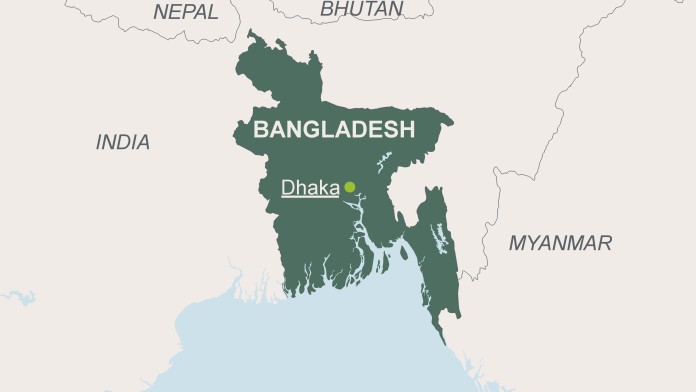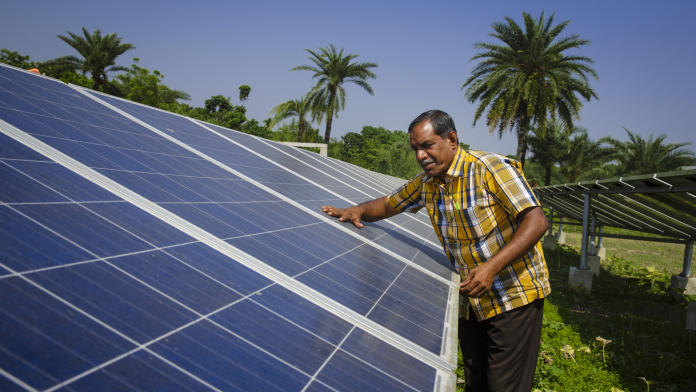
As of: 08/2022
The government of Bangladesh is pursuing ambitious targets both in terms of economic growth and the Paris Agreement. This is another reason why the Bangladeshi government has made energy production and transmission a priority on its political agenda. In the future, the aim is to generate at least 10% of electricity from renewables. This is intended to contribute to improving the energy supply to the growing population and to meeting the defined climate targets.
Bangladesh is densely populated, with free space scarce as any available land is needed for agriculture and food production. Photovoltaic systems on the roofs of existing buildings in villages, towns and cities can produce sustainable energy and prevent distribution conflicts with the agricultural sector.
On behalf of the German Federal Ministry for Economic Cooperation and Development (BMZ), KfW is supporting Bangladesh’s first grid-connected rooftop solar installation project. At the same time, what are known as off-grid photovoltaic system projects are being promoted. These include solar power systems that do not feed electricity into a supra-regional power grid, such as solar-powered irrigation pumps and “mini-grids”.

Bangladesh has made great strides in energy production in recent years – in 2010, only about 50% of the population was connected to the electricity grid, whereas today, it is over 95%.
However, in rural areas, where a vast majority of the population lives, an adequate, permanent electricity supply is still lacking. As a result, children do their homework at night by light from unhealthy kerosene lamps, and agricultural products spoil as a result of insufficient cold chain networks.
Bangladesh has massively increased its electricity generation – in 2010, only 50% of the population was connected to the power grid, whereas today, it is over 95%.
Businesses often suffer from power cuts, sometimes on a daily basis. This hinders production and results in lost sales. At the same time, the government is relying on continuous economic growth to raise the population’s living standards. Bangladesh’s energy demand is therefore expected to increase further in the coming years. The most important energy source, locally produced natural gas, is running out and is also harmful to the climate. The fossil fuels natural gas, oil and coal will remain the most important sources for securing the basic supply of energy in the medium term. Independently of this, the government is going to great lengths to expand electricity generation from renewable energy. This is mainly done: 1) to ensure that the electricity needs of the economy are met, 2) to supply power to the rural population and 3) to develop sustainable energy sources. As Bangladesh has only limited potential for renewable energy, rooftop solar PV systems have a key role to play in the development of sustainable energy sources.
People living outside cities and in remote areas depend on land to produce food and safeguard their income. Renewables must therefore be expanded in a way that protects the land. The project is based on proven methods, aiming to persuade businesses and private individuals to install solar power systems on their roofs. This sustainably generated energy then benefits the entire population. Where connection to the grid is not possible, solar power is used locally.
This is accomplished, for example, by setting up a local power grid that distributes energy within a village. In addition, solar-powered irrigation pumps make it possible to grow crops without having to rely on the general energy supply. In many places, diesel-powered irrigation pumps will be replaced by solar-powered pumps.
KfW is cooperating on the project with the Infrastructure Development Company Limited, a public-sector financial institution (non-bank). The project approach is structured as follows:
IDCOL itself will provide loans to companies, investors, non-governmental organisations and interested groups to finance renewables. The use of solar energy is a financially worthwhile investment for businesses to reduce their electricity costs.
The potential for rooftop solar installations is estimated to be 250MW by 2050.
The project will improve access to environmentally and climate-friendly electricity in Bangladesh. At the same time, it is helping to modernise the energy supply in Bangladesh and improve its impact on the climate. Renewable energy provides cost-effective and environmentally friendly access to energy, even in areas where the national grid is not yet developed. In addition, renewable energy will replace traditional and unhealthy energy sources, such as diesel. This will improve the population’s living conditions, strengthen local economies and prevent greenhouse gas emissions.
The project contributes to the achievement of these following United Nations Sustainable Development Goals:
KfW Group
KfW Development bank
KfW Office Dhaka
Share page
To share the content of this page with your network, click on one of the icons below.
Note on data protection: When you share content, your personal data is transferred to the selected network.
Data protection
Alternatively, you can also copy the short link: kfw-entwicklungsbank.de/s/enzBYvks
Copy link Link copied